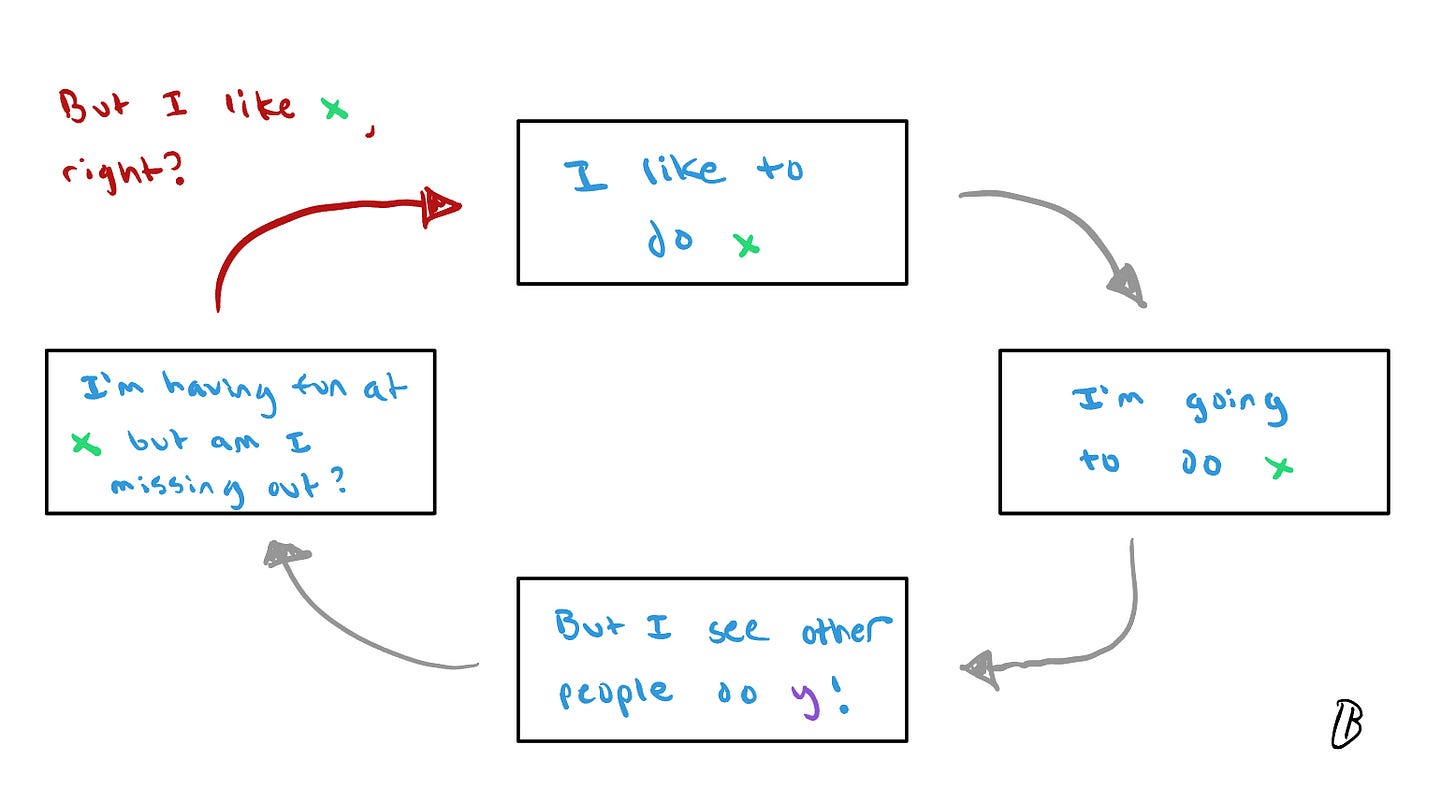Happy Monday everyone,
This week’s post is a bit longer, so I’ll leave you to it right away. This is just one theory I have about some of the deleterious effects of social media. Let me know what you think!
I. What Seems ≠ What Is
Going to college at a party school can be shocking. When people are going out four times a week, it’s easy to feel like you’re missing out, or that nobody actually cares about their future.
While it seems like everyone gets drunk off their asses most nights, I’m confident that there are many out there who have goals and like to stay in from time to time (hint: I’m one of them).
The thing is, we just don’t hear about them as much.
Think about it: it’s much “cooler” to post on social media that you’re out partying than to post a selfie of you watching Narcos (who would post that anyways?).
This is a great example of what behavioral psychologists call the availability heuristic: a bias where we make decisions based on examples that we ourselves see or vivid experiences that we’ve had.
For example, after a terrible flight experience in her youth, my psychology teacher decided that she would never fly again, even though it’s quite clear that commercial aviation is statistically safer than driving.
In the case of the college student, he comes to the conclusion that he’s missing out on something, because he sees his online friends posting pictures about partying online.
Even though he decided to stay in that night to rest and recharge, he questions that decision, simply because it seems like everyone is going out and having fun.
II. The FOMO Cycle
What’s to blame? Probably social media.
It’s interesting to think: before the internet, typical college festivities would occur, but the fear of missing out (FOMO) didn’t exist. People would make plans for the weekend and would enjoy themselves (unless they drank too much). They never questioned their own decisions.
Our online omniscience ends up creating a maladaptive cycle:
As Theodore Roosevelt briefly put it:
“Comparison is the thief of joy.”
These comparisons are not accurate, either. While that’s obvious, many people still make the mistake of “comparing people’s outside to our insides,” or as clinical psychologist Meg Jay puts it:
“We are comparing other people’s edited shots with our own unretouched lives. We are comparing the good things people make public with the not-so-good things we keep to ourselves. We are bombarding our brains with information that—in milliseconds—will likely make us feel bad.” - The Defining Decade
Or as Bill Gates cautioned:
“Don’t compare yourself with anyone in this world. If you do so, you’re insulting yourself.”
III. Missing Out is a Good Thing
How can we combat this? Two things: a mental frameshift, and a “less is more” approach.
First, we need to rethink FOMO and reshape it to what author Oliver Burkeman calls the Joy of Missing Out:
“It is the thrilling recognition that you wouldn’t even really want to be able to do everything, since if you didn’t have to decide what to miss out on, your choices couldn’t truly mean anything.” - 4 Thousand Weeks
In other words, we have given up everything we could have done for what we chose to do, right now. Our choices have serious meaning:
But because there are seemingly more options than ever before about how to spend our time, it’s easy to be less satisfied with our decisions. This is what psychologists call the paradox of choice: the more options we have, the less happy we’ll be with our decisions.
One great way to reduce this overwhelm is to restrict social media use. Try deleting social media for a week (yes, that includes TikTok too). Seriously though, do this.
There’s a very good chance you’ll be less anxious, stop questioning yourself, and have more time to do what actually matters, like reading a book or picking up that hobby you’ve always wanted to do.
The average person who uses Snapchat, Instagram, and Tik Tok will have spent nearly two hours on their phone every day.* Over a year, that’s at least one month of your life, spent observing the lives of people you hardly know.**
Living in today’s world with less social media feels strange at first, but I’ve already seen how it leads to a more present and fulfilling life, true to oneself. Maybe most important of all, it’s much more conducive to developing deeper relationships with people, in real life.
By using social media in a healthier way, we have less comparisons to make, we don’t insult ourselves as much, we develop more compassion, and we lead deep, real lives. Instead of watching the movie of others’ lives, we need to live our own. As a result, we can become happier, and less lonely.
Everyone has their own definitions of fun. What, truly, are yours?
I hope you try it out,
Baxter
To view this on my website, click here.
Footnotes
*That’s just the average person too, according to this survey. I’ve personally seen people where even just TikTok use borders on two hours a day.
**I do think that if you curate your social media feed to be learning new things, there’s no shame in that. Some of my favorites on Instagram are Andrew Huberman, Ph.D., Peter Attia, MD, Ryan Holiday, and Robert Greene. However, reels are addictive, so I minimize my time on Instagram.
Cover Photo by Andre Mouton on Unsplash



